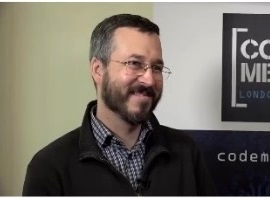InfoQ Homepage Languages Content on InfoQ
-
Adam Tornhill on Code as a Crime Scene, Git and Static Analysis, Clojure
Adam Tornhill explains how to treat code as a crime scene, analysing Git repositories to discover team behaviours and code smells, the pros and cons of Clojure, and much more.

-
Interview with Simon Ritter on Java 9
Alex Blewitt talks to Simon Ritter at QCon London 2016 about Java 9, the impact that Jigsaw will have on developers, and Java on the Raspberry Pi along with the differences between the Azul JVMs and Open JDK.

-
Interview with Gil Tene on Hardware Transactional Memory
Gil Tene speaks to Alex Blewitt at QCon London 2016 on the upcoming support for hardware transactional memory in server-class Intel chips, and what it will mean for the JVM. Tene discusses what kinds of applications will benefit from speculative lock elision and increasing concurrency in the near future on multi-core server platforms.

-
Josh Long on Spring Boot, Spring Cloud and Microservices
Josh Long talks about the philosophy behind Spring Boot and Spring Cloud. He also discusses some of the common distributed computing problems Pivotal are trying to solve - externalised configuration, service discovery, client-side load balancing, distributed tracing and so on, and talks about some major clients including Netflix, Baidu and Alibaba.

-
Gil Tene on Understanding Latency
Gil Tene explains latency and how it relates to service and response times, measuring latency, common misconceptions about latency, what to do when a system's latency can't meet SLAs, and much more.

-
Leah Hanson on the Julia Language, Static Analysis
Leah Hanson explains the characteristics of the Julia language, its type system, how to use and implement static analysis for the Julia language in the Julia language, and much more.

-
Monica Beckwith on Tuning and Optimizing Java Garbage Collection
Performance engineer Monica Beckwith covers tuning java garbage collection, including: defining customer requirements; methodology; baselining and measurement; strengths and weaknesses of the different collectors; heap usage; causes of GC pauses; the distribution of pauses; tuning pause characteristics; going off-heap to avoid collection; scaling GC on multi-core and high memory machines.

-
Sylvan Clebsch on the Actor-Model Language Pony, Garbage Collection, Capabilities, Concurrency
Sylvan Clebsch introduces Pony, a language built on the actor model which combines new approaches to garbage collection and concepts like capabilities to write high performance, concurrent code.

-
Rick Hudson on Garbage Collection in Go
Rick Hudson talks to Charles Humble about the evolution of Go’s garbage collector, comparing 1.5 to the forthcoming 1.6 release, and also touching on plans for 1.7.

-
Lisa Crispin and Janet Gregory on (More) Agile Testing, Learning and New Approaches
Lisa Crispin and Janet Gregory talk about how they came to collaborate on the "Agile Testing" books, the testing skillset and approaches to learning, and new and interesting approaches to testing.

-
Mik Kersten on Current and Future ALM Trends
Mik Kersten talks about current and future trends in ALM and the support for approaches like large scale Agile, DevOps, Docker, Big Data, functional languages and the Internet of Things.

-
Chris Richardson on Functional Programming in Scala and Java, Event Sourcing
Chris Richardson explains the appeal of Scala, functional programming in Java and other languages, the basics of Event Sourcing, and his perspective on the state of the Java ecosystem.
